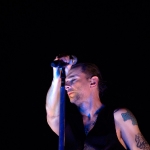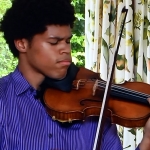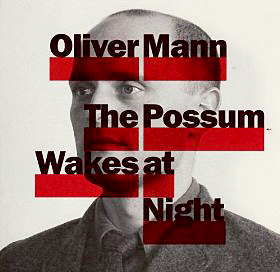Oliver Mann: The Possum Wakes At Night (Preservation)
Released 7 September 2009
Australian baritone Oliver Mann’s background as an artist partly began in classical music and opera - he sings with the Victorian Opera and curates an annual Schubert recital. However, he has also spent many years home-recording his own songs as well as playing them in pubs, often accompanied by compelling yarns during sets. His love for telling a tale also comes into his weekly performances for children’s story time at his local library, this playing a defining role in his unique take on songs. Add to that a love of Elvis Presley, golden-era musicals and early blues and you have in Mann a vision pushing past the point of merely eccentric into the shiningly enigmatic.
Appearing on this album are The Dirty Three’s great drummer Jim White, Karl Scullin (Kes Band), harpsichordist David O’Brien and Grand Salvo, otherwise known as Paddy Mann and also Oliver’s brother. There are also three soprano singers in Fiona Clark, Monica Sonad and Jordina Howe who accompany Mann throughout. As well as singing Mann plays guitar, harmonica and percussion on the album.
In my experience there are precious few classically trained singers who can make the transisition from opera to popular music with total success. Yes, we have a few over here in the UK but I’ve yet to hear any of them come close to Italy’s wonderful tenor Andea Bocelli who is able to make the journey seamlessly and with great success. But a baritone making the transition to contemporary folk music? Never heard such a proposition - until now. When I listen to Mann I’m reminded of another great contemporary, Roy Harper, surely the UK’s finest exponent of contemporary folk.
Now I lived in Australia for a few years and I can tell you that the Possum is a cute nocturnal creature (somewhat similar to a squirrel) that has the habit of climbing into house roof-spaces to set up home in a more comfortable air-conditioned environment. When they roam at night they create a cocophany of sound above one’s head that ultimately drives one to call the Possum Man to remove the offending (but beautiful) furry creature. No such problem with Mann’s album…
‘Diamonds In Silver’ opens with the rhythmic thrum of an acoustic guitar and, very quickly, the first example of Mann’s singing. It’s a reassuring, expressive, mellow and thoughtful voice; storytelling to music; and one that forces one to listen with a level of intensity that’s rare in my experience. This is the type of folk music that that I have been praying for; modern and without that traditional twang so common on the British folk scene. The sparse instrumental arrangement and super-subtle backing vocals are perfect, the melody restrained but tangible - it’s a complete and moving song.
‘By The Rock I Roll’ is of more traditional Celt hue with Mann contributing one of the most expressive vocals on the album. The shimmering instrumental passages (with and without vocals) are superb and intensely moving, the pace is glacial, the whole utterly beautiful and compelling. Towards the end of the song Mann’s voice soars accompanied by the addition of stark percussive sounds - I’m drawn in and won over. ‘Australian Gothic (Canon)’ offers a brief spell of harpsichord and then silence before Mann’s voice rolls gently in on ‘Sun Shines In’ accompanied by banjo and guitar. The pace is somewhat faster, the vibe more contemporary and ambitious, the melody bolder.
‘Canon, Carefully, Quetly’ is introduced by a single then multiple soprano female voices accompanied only by the returning banjo. Instruments then take over the story with plucked banjo and the most mournful of Mann harmonica solos to end an ethereal and touching musical interlude. ‘Hells Bells (I, II, III)’ moves quickly along with Mann adopting a higher key to tell the tale. There’s multi-layered vocals, gorgeous instrumental passages, changes of pace, angelic backing vocals, strong melody and an underlying darkness that reveals itself later in the song. It’s an album highlight, contains the most complex musical structure here, and clocking in at over seven-mintes is also the album’s longest song.
‘Evie’ takes on a more gentle, contemplative vibe with Mann’s voice matched perfectly as it virtually whispers the lyrics. ‘Canon: Crackers Cracking’ contrasts sharply with its sharper sonic tones and Jim White’s (recognisable) intuitive and improvised drumming. It’s an extraordinary track complete with the sound of scratched vinyl, dull thud of fireworks and the most delicate vocal harmonies. ‘Slow Dancing’ is dominated by the steady flow of instruments, twinkling bells and percussive sounds. ‘Dancing’ has a rapid-fire and distinctive rock-pop vibe which includes electric guitar soaring away in the background. Mann’s voice changes again and at one point provides a talking commentary above a layer of hand-claps and crowd samples. Then the harmonica returns to close a song that reeks of adventure.
‘The Final Light’ is a compelling mix of more tradional vocal, piano and glorious acoustic guitar passages. It’s another standout track. ‘Fireworks’ is a softly wandering song with another sensitive and ultra-expressive Mann vocal performance and the most subtle of instrumental backdrops - the ideal ending to a superb and beguiling collection of songs.
2009 has proved to be a magnificent album release year and most notably for the extraordinarily diverse and eclectic range of music exposed. Arguably the only type of music missing from what I have heard is a modern take on traditional folk music, a vacuum now filled so admirably by Australian baritone Oliver Mann and his band of wonderful musicians. For those folk music lovers who have been looking for an acceptable and beautiful bridge between the old and new - Look No Further…
4/5
|
|

|

Depeche Mode |
LATEST GALLERY IMAGES

The Kanneh-Masons 
Sting 2025 |
|
|


